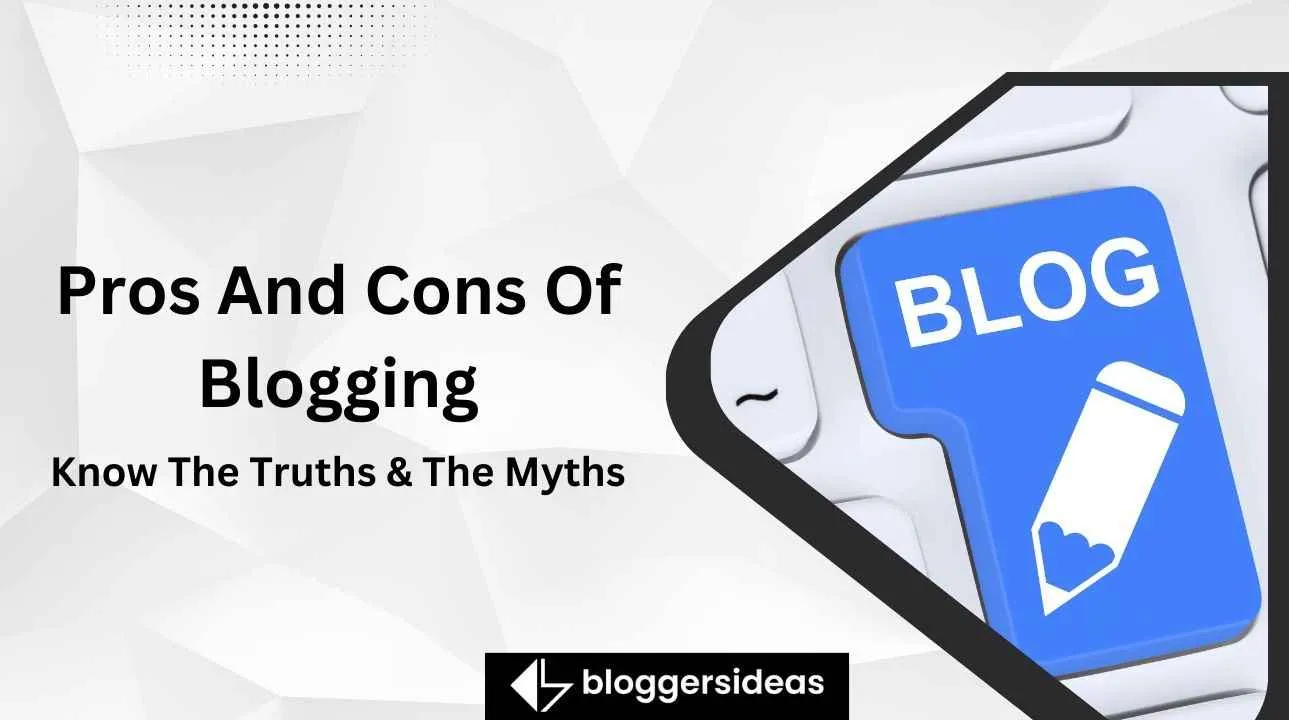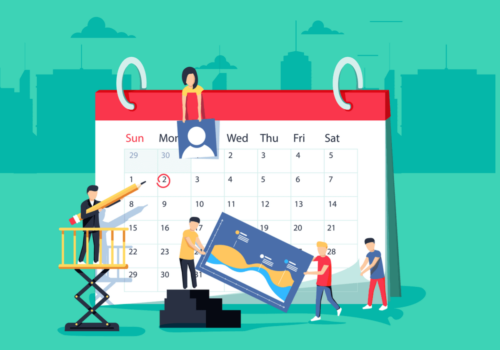In this blog, I am going to share the Pros And Cons Of Blogging.
Blogs were once a teen thing, right? As early as 1994, internet early-adopters who created online forums and personal profile pages created long-form essays, reviews, opinions, and stories, but no one knew how integral weblogging (shortened very quickly to “blogging”) would become.
Newer platforms like WordPress, Tumblr, and Medium soon replaced Blogger and LiveJournal, making it unnecessary to become a web designer in order to start a blog.
The Huffington Post was among the first media operations to morph into a massively complex operation as a result of the ability of news blogs to provide breaking stories more quickly than traditional media outlets.
Despite being bemused at first, many newspapers that originated in print soon developed blogs of their own.
Bloggers no longer belong to a strange subculture. Our world is filled with potential bloggers, and every business is looking to build buzz through blogging. Blogs can be businesses in themselves.
You may wonder, though: does it really make sense to start another blog on the internet so saturated with them?
That’s what today’s topic is all about. This article is for anyone looking to start a blog, whether it be for business or personal use.
Pros And Cons Of Blogging
The Pros of Blogging
What do you think is the best part of blogging in 2024?
1. Easier Than Ever
Originally, blogging was as simple as starting an ugly blog on LiveJournal, starting an ugly blog on Blogger, or learning how to code. Those days are thankfully long gone.
There are many tools that allow you to build a great-looking blog at your own domain, including WordPress.org, Medium, and Wix. You can now create a blog from scratch in a few clicks, saving you a lot of time.
2. Low Startup Costs
There are a lot of people who think you have to spend lots of money to launch a great blog. No such thing exists.
Your blog can certainly benefit from ad spending, marketing automation tools, and other investments as it grows: social media ads, marketing automation tools, etc.
To start writing, you only need a keyboard, a platform, and a few words. You don’t have to spend money upfront to get started. There are no shortcuts to success. The best content will make you successful.
3. Drives Traffic To Your Website
Your website might not necessarily attract web surfers by itself, no matter how awesome it is. There is not a lot that sets you apart from your neighbors, for example, if you market plumbing services.
You can use blogs for search engine optimization as well as for sales. Furthermore, a sales funnel allows you to simplify the sales process, which increases the chances of a sale.
A tool such as ClickFunnels can help you with this.
4. Builds a Community
It’s exciting to attract loyal followers when you blog. It’s more interesting to have a real conversation than just to hear one person talk, and there’s no greater thrill than to find out your work has touched someone.
Besides being the people you do all the work for, word-of-mouth marketing is the most powerful marketing you can buy – it’s priceless.

5. Showcases Your Work
Would you like to build a career as a writer online but have yet to receive a byline? You may want to consider blogging.
It may not be on your own domain, but a well-edited, well-formatted post shows potential clients or employers that you know how to write.
You must pay equal attention to format, punctuation, grammar, and syntax if you are using your blog as your portfolio. Don’t forget to have fun when writing reviews! Imagining each post as a cover letter is a fun way to get started.
6. Easy to Monetize
Once you establish a blog, you can make money in numerous ways. You can make money from blogging via subscriptions or Patreon donations, but blogs can also be used to drive traffic to your online store.
There is more to it than that, however.
The ability to sell ad space, promote sponsored content, and earn commissions through affiliate marketing are all excellent ways to make money with your blog.
7. It’s Fun
While developing content for your blog can be a lot of work, getting it on the page itself can be great fun.
It would be great if, after returning from your dream vacation, you could craft the perfect post, along with photographs and videos, that made all your followers feel like they were there, too.
Then you see your followers rush to buy your favorite indie video game that no one has ever heard of. Even a blog can be a hobby – it’s not just a tool!
The Cons of Blogging
Starting a blog has its challenges; what are they?
1. A Crowded Market
There are over 600 million blogs on the internet, which is about one blog for every ten humans. In other words, that is market saturation at its finest, and it will only get worse.
Unfortunately, everyone writing a blog has to compete in the same overcrowded field, and the best time to start a blog was yesterday.
Having a well-written blog is still absolutely possible, but content alone won’t get you a following.
2. Demands Consistency
Experts tend to agree that you must update consistently if you wish to build an audience.
As an example, consider two blogs on the same topic, one written by a qualified expert every Monday and Thursday and the other written whenever the writer wishes.
What is likely to become a part of your routine, and what will you ignore? You need to take blogging very seriously if you want to build a community of readers. Although it’s inexpensive, it’s hard.
3. Do Everything Yourself
Scheduling isn’t enough. It can be exhilarating and liberating when you’re just starting out as a blogger to lead your own web project, but unless your blog is purely a hobby site, you’ll need to think like an entrepreneur as well.
We’d all love it if great content found an audience effortlessly, but in reality, generating buzz and building marketing strategies require diligent effort while keeping faith that it’ll pay off.
Your blog should be run like a business if you want to monetize it.
4. Good Content Isn’t Easy
Of course, you also need a strategy for both content and marketing, as well as thinking like a creator.
If you choose a topic for your blog, ask yourself how long you could write posts on it. You may need to broaden your focus or shift your focus if it’s less than six months.
The way you write will have a dramatic impact on how you include content such as images, videos, and audio clips, so decide if SEO is important to you. It’s a reminder that being a successful blogger requires heavy lifting.
5. Potential Technical Issues
If you are using a blog platform, you may be more likely to encounter technical difficulties than if you are using a blog platform.
However, because you have more control over your blog’s look and feel, you are more likely to experience technical difficulties, such as slow page loads, blank screens, and theme/plugin compatibility issues.
Squarespace is a great tool with pre-made themes and a simple editor, but it limits your control, while a WordPress-powered blog puts you back in the driver’s seat, but you’ll have to put in more effort to make it work.
Should You Start a Blog?

Is starting a new blog worth the effort, given how many already exist and how much work it takes? Yes, as long as you’re willing to work hard.
Blogs became popular 20 years ago and have continued to do so since then for a reason: they are one of the most efficient, effective, and fun ways to promote your brand.
Even the most targeted marketing campaign cannot create a dedicated following of loyal readers who incorporate the blog into their daily routines in the same way that a good blog can.
People are drawn to blogs because they add value to their lives for free (unless they count the internet connection), and if your blog does that well, people will follow you further and become customers.
Choosing your subject before deciding how much design control you want is important.
Create a regular posting schedule and interact with other blogs to build a following based on the platform you choose. Make a plan to evolve towards monetization if that is your goal. Do not start out with a focus on monetization.
FAQs
🤔 What are the top benefits of blogging?
Blogging offers numerous benefits, including the opportunity to share your expertise, build a personal or professional brand, and connect with a like-minded community. It can also improve your writing skills, boost your website's SEO, and potentially generate income.
🚧 What challenges do bloggers face?
Bloggers often encounter challenges such as finding the time to consistently create content, generating traffic to their blog, standing out in a crowded niche, and dealing with negative comments or feedback.
💡 Can blogging be a reliable source of income?
Yes, blogging can become a reliable source of income through various channels like affiliate marketing, sponsored posts, selling digital products, and displaying ads. However, it usually takes time and consistent effort to reach a significant income level.
🤝 Can I build a network through blogging?
Absolutely! Blogging can help you build a professional network by connecting you with readers, other bloggers, and industry experts. Engaging with your blog's comments section and participating in blogging communities can foster valuable relationships.
🛠️ What are the essential tools for starting a blog?
Essential blogging tools include a content management system (CMS) like WordPress, a reliable hosting service, SEO tools for keyword research and analysis, and social media platforms for promotion and engagement.
📚 Do I need to be an expert to start a blog?
Not necessarily. While expertise can lend credibility and attract a readership, passion and a willingness to learn and share your journey can also make for compelling blogging. Many successful bloggers start as enthusiasts and grow their expertise over time.
🔍 Is it hard to find topics to write about?
Finding topics can be challenging, especially over time. However, staying updated with industry news, listening to your audience's questions, and using keyword research tools can provide a steady stream of ideas for your blog.
Quick Links
- The Power of Influencer Blogging: Building Your Brand
- How To Make More Money From Blogging? (Easy Guide)
- Passive Income Blogging: How To Earn Money With Blogging?
- Common Mistakes That New Bloggers Make?
- Actual Purposes Of Starting A Blog & How To Earn Passive Income With Blogging?
Conclusion: Pros And Cons Of Blogging
Blogging can be a great way to share your thoughts, connect with others, and even make some money.
But it’s not always easy. You’ll need to put in the time to create interesting posts and engage with your readers. Plus, standing out in a crowded online space can be tough.
On the flip side, blogging gives you a creative outlet and the chance to build a community around your interests.
So, is blogging worth the effort? It depends on what you’re looking to get out of it.





